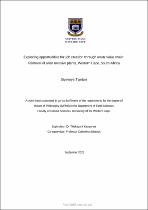| dc.contributor.advisor | Kanyerere, Thokozani | |
| dc.contributor.author | Twetwa, Siyavuya | |
| dc.date.accessioned | 2022-08-04T12:40:56Z | |
| dc.date.issued | 2022 | |
| dc.identifier.uri | http://hdl.handle.net/11394/9206 | |
| dc.description | Magister Philosophiae - MPhil | en_US |
| dc.description.abstract | Alien invasive plants are often end up in landfills after they are removed, where they form
part of organic waste. Wood contractors can utilise this organic waste as a source of informal
employment, which is also a waste reduction method. The aim of this study was to explore
opportunities for job creation through the removal of alien invasive plants, as the basis for
developing a business structure that addresses unemployment. First, the impact of alien
invasive plants on the environment and water resources was explored. Then, the impact of
removed alien invasive plants on the socioeconomic status of people was assessed. | en_US |
| dc.language.iso | en | en_US |
| dc.publisher | University of the Western Cape | en_US |
| dc.subject | Job creation | en_US |
| dc.subject | Plants | en_US |
| dc.subject | Western Cape | en_US |
| dc.subject | Organic waste | en_US |
| dc.subject | Unemployment | en_US |
| dc.title | Exploring opportunities for job creation through waste value chain: Removal of alien invasive plants, Western Cape, South Africa | en_US |
| dc.rights.holder | University of the Western Cape | en_US |
| dc.description.embargo | 2023 | |

